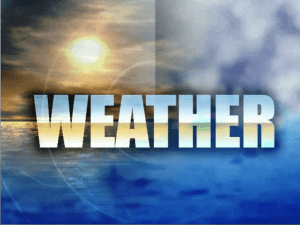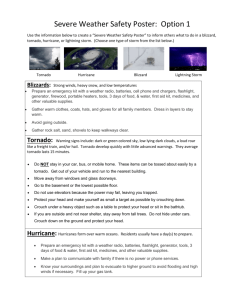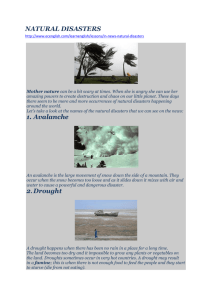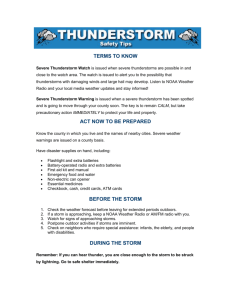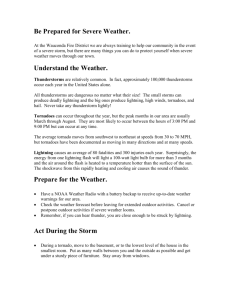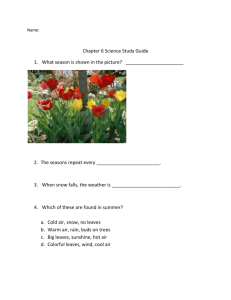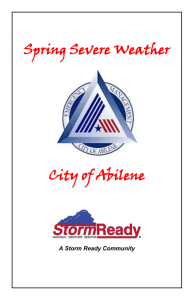Weather and Emergencies
advertisement
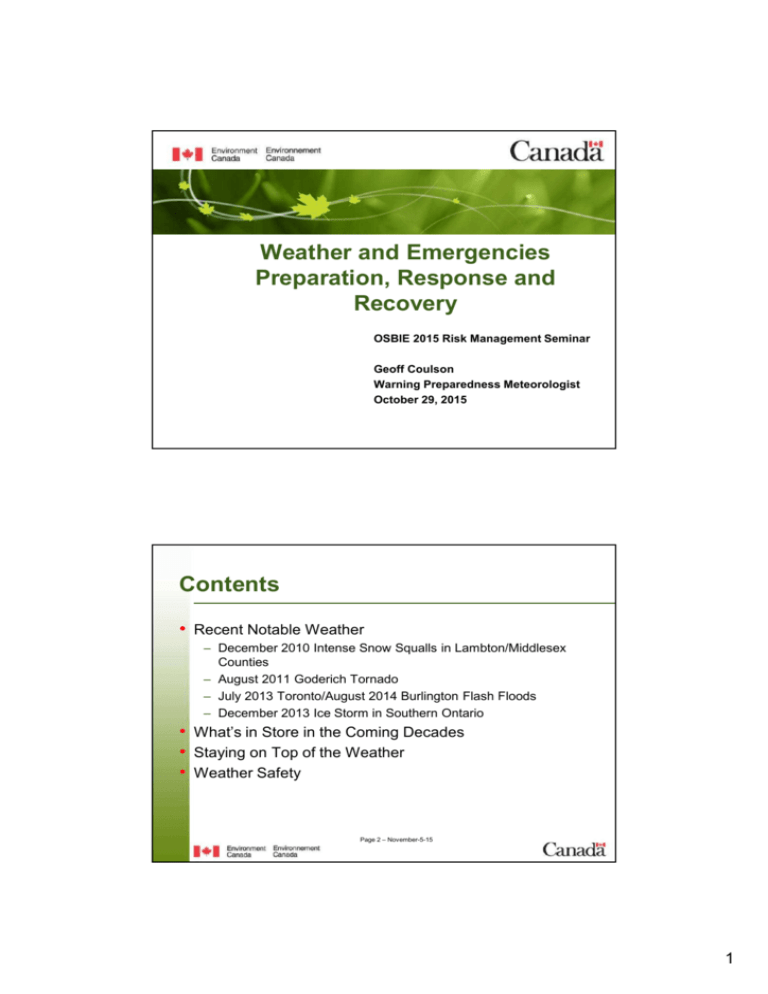
Weather and Emergencies Preparation, Response and Recovery OSBIE 2015 Risk Management Seminar Geoff Coulson Warning Preparedness Meteorologist October 29, 2015 Contents • Recent Notable Weather – December 2010 Intense Snow Squalls in Lambton/Middlesex Counties – August 2011 Goderich Tornado – July 2013 Toronto/August 2014 Burlington Flash Floods – December 2013 Ice Storm in Southern Ontario • What’s in Store in the Coming Decades • Staying on Top of the Weather • Weather Safety Page 2 – November-5-15 1 Ontario has always experienced 4 full seasons of weather Page 3 – November-5-15 Images from Ontario Travel Blog, CBC, Where.ca, Toronto Sun, Sarah Dea Photography December 13-14, 2010 Intense Snow Squalls East of Sarnia Tweet: LambtonMall: Snow squall warnings continue Environment Canada says a snow squall warning continues today for Sarnia, Petrolia, ... http://ow.ly/1arHMc Sarnia, ON Dec 14, 2010 08:25 AM EST Page 4 – November-5-15 2 Goderich F3 Tornado – Aug 21 2011 Page 5 – November-5-15 Page 6 – November-5-15 3 2011 Goderich F3 Page 7 – November-5-15 July 2013 Toronto/August 2014 Burlington Flash Floods Images from Cody Law, O.Canada.com, CBC, Lexikubrak.com Toronto Star Page 8 – November-5-15 4 Page 9 – November-5-15 December 2013 Ice Storm Southern Ontario Page 10 – November-5-15 5 Ice Accretion 15 10-20 cm SNOW/IP 20 4 30 20 20-30 25 15-25 24.8 20 27.7 30-50 mm RAIN Ice Accretion in mm Page 11 – November-5-15 What’s in Store in the Coming Decades? Page 12 – November-5-15 6 Cold Winter? What happened to Global Warming/Climate Change? • Climatologists study past trends and forecast future ones • • • that stretch over decades Still lots of potential for big variations from year to year and season to season Changes are global (i.e. Cold Winter in Prairies/Ontario but milder winter in B.C./Yukon/Alaska) Long-term trends become apparent when many years are studied Page 13 – November-5-15 Winter 2014-15 warmest globally…but not so much here in Eastern North America… Page 14 – November-5-15 7 Temperature • Average temperatures in Canada up 1.5 deg C since • • • • 1950...greatest warming in the North and during winter and spring Increase in annual/seasonal temperature Increase in number of hot days (T >= 32 Deg C) and heat waves Increase in number of heat-related mortalities Decrease in number of extreme cold days Page 15 – November-5-15 Precipitation • • • • • Canada has become generally wetter in recent decades Increase in intensity and frequency of heavy rainfalls Increase in frequency and severity of drought More precipitation in the form of rain/freezing rain as opposed to snow during the winter Greater chance of “ice storm” type events Page 16 – November-5-15 8 More Extremes? • • • • Thunderstorms? Tornadoes? Blizzards? Windstorms? Page 17 – November-5-15 Staying on top of the Weather Page 18 – November-5-15 9 Ontario Storm Prediction Centre • Responsible for Weather Program across Ontario • Operates 24/7 • One of 7 Weather Centres in Canada Page 19 – November-5-15 Short-Fuse vs. Longer Lead Time Short-Fuse…perhaps minutes… Longer lead time…perhaps hours Page 20 – November-5-15 10 EC Messages • Special Weather Statement – Interesting, noteworthy, some possible impacts • Advisory – Impacts likely (frost, fog, blowing snow) • Watch – Potential for significant weather/impacts • Warning – Significant weather/impacts likely Page 21 – November-5-15 ECAlertMe – Email Weather Alerts • User-configurable program to receive emails of severe • • weather watches/warnings Can decide to only receive first warning and last warning…reduce avalanche of messages https://ecalertme.weather.gc.ca Page 22 – November-5-15 11 Weatheradio • Continuous broadcast of weather info • Line of sight broadcast…trees, hills may • • • disrupt signal Standby mode Tone Alert when Warnings issued Specific Area MEessaging – SAME Get the Warnings for YOUR area Special frequencies…so require a special receiver Page 23 – November-5-15 Google Public Alerts • Environment Canada now using Common Alerting • • Protocol (CAP) format for all of our weather warnings This will allow more 3rd parties to receive and display our warnings along with American warnings Google one of the first companies to take advantage on their Google Public Alert site at… – http://www.google.org/publicalerts • In the U.S. many alert types available (i.e. Presidential Warnings, Amber Alerts, Missing Persons etc..) Page 24 – November-5-15 12 Page 25 – November-5-15 Warnings Through Twitter and ATOM on Weather.gc.ca Page 26 – November-5-15 13 Alert Ready • CRTC ruling earlier this year that broadcast media must • • immediately send out alerts to the public related to threats that pose an imminent threat to life or property In addition to Alerts that are related to weather (i.e. tornado, severe thunderstorm, flash flood), Alerts related to widespread fires, biological hazards, hazardous material spills/releases etc...could also be sent out http://www.theweathernetwork.com/public-alerts/#alerttwn Page 27 – November-5-15 Page 28 – November-5-15 14 Radar Imagery – Intellicast.com Page 29 – November-5-15 Page 30 – November-5-15 15 Smartphone Apps Radarscope, Degrees, Storm Page 31 – November-5-15 Weather Safety Page 32 – November-5-15 Shane Coulas WeatherNetwork 16 Lightning Safety • Biggest summer severe weather hazard • Environment Canada does not issue watches or warnings if • lightning is the only threat First strike can occur nearby with no previous lightning Ken Rivas – WeatherNetwork 24 2011 Page 33 – November-5-15 Mississauga Aug Page 34 – November-5-15 17 Lightning Strike – Close Call Page 35 – November-5-15 Lightning Safety Rule • When Thunder Roars, Go Indoors • Seek solid/best shelter immediately • Remain in that shelter for a full 30 minutes after the last rumble of thunder Page 36 – November-5-15 18 Bolt from the Blue Page 37 – November-5-15 Lightning Safety • Best Shelter – Solidly constructed building…away from windows, doors, plumbing…don’t use landline phone. – Car/Truck…if no solid shelter nearby…BUT Car/Truck must have metal roof – NO place outside is safe during a thunderstorm…make every effort to find solid shelter Page 38 – November-5-15 19 EC Lightning Danger Map • Weather.gc.ca/lightning • Based on recent lightning activity, map shows where lightning danger may exist over the next 10 minutes Page 39 – November-5-15 Lightning Info – lightningmaps.org Page 40 – November-5-15 20 Tornado/Downburst Safety • Best shelter…well• • constructed building in the basement As many walls between you and the outside as possible…away from windows AVOID…shopping malls, arenas, gymnasiums Page 41 – November-5-15 Remember what we said about gymnasiums?? • March 2, 2012 – Henryville, Indiana – EF4 tornado hits high school Page 42 – November-5-15 21 Tornado/Downburst Safety • Outdoors…make best of a bad • situation Cabin/Cottage? – Centre of structure…under sturdy furniture • • • • • Campground washrooms? Car/Truck? Avoid tall trees Low-lying area…lie flat, protect head Flying debris injures and kills Deb Ellis Page 43 – November-5-15 Dangerous Misconceptions • Highway overpass is a good shelter. WRONG...overpass can funnel winds and collect debris...very dangerous place to be • I should open the windows in my house in advance of a strong storm/tornado to “equalize” pressure. WRONG...opening windows allow wind forces inside your home...can help to lift off roof and collapse walls Page 44 – November-5-15 22 Rochelle, Illinois EF4 Tornado – April 9, 2015 Page 45 – November-5-15 Flash Flood Safety – Turn Around, Don’t Drown Page 46 – November-5-15 23 Winter Weather Safety • • • • • • • • • Monitor the weather forecast Dress in layers Limit time outdoors Get out of the wind, if possible Stay dry Stay active Watch for signs of frostbite Car emergency kit Home emergency kit (i.e. 72 Hours) Page 47 – November-5-15 Page 48 – November-5-15 24
